
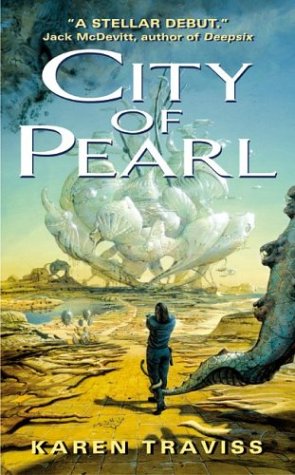
There are moments when a relatively unknown author comes along and creates a work of science fiction which does not disappoint in any manner; City Of Pearl is such a novel. Shan Frankland is a police officer, she is very good at her job as a Environmental Hazard Enforcement cop, and most important of all to her, a more than earned retirement is almost upon her. However, things are never that cut and dry. Somewhat coerced to oversee a mission to a remote planet with a similar atmosphere to Earth - she forlornly accepts. Her team consists of a small squad of marines, a group of scientists representing various corporations back on Earth, and a reporter. Shan will spend a sizeable seventy five years in transit to a lost human colony. One of the joys of this novel is that this is just a pretext to the heart of the story. Orbiting Cavanagh's Star is a planet that is inhabited by three sentient life forms. A flourishing colony of humans, the aquatic Bezeri and a lone Wess'har sentinel named Aras. Of the three only the Bezari are lifeforms evolved on the planet. Traviss excels in her descriptions of alien fauna and flora. She keeps things simple but continues to reveal a seemingly untouched ecology that is inhabited by fearsome creatures and is fearlessly protected by the largesse of Aras and his people. The human colony of Constantine is inhabited by a religious Christian sect that share a very long history with Aras. Aras is a being, a now more than living legendary super soldier to whom both the humans, the Bezari, and the vanquished race of the isenj are more than aware of. He is many things to many different people, thought deep down he is a very lonely male, seemingly doomed to live a near immortal life thanks to the parasite c'naatat. Both he and Shan have more in common than their alien physiology would suggest. This is by no means a hard science fiction novel. It is without doubt a novel that draws many references from how modern human beings are destroyers, and unleashers of destruction on an environment that cannot cope with their arrival. Paradise found is paradise lost! As I read more and more of this novel I found that the genocide meted out by Aras and his kind was all too understandable. Such wanton destruction of a planet's ecosystem, and the subsequent punishment delivered really did resonate with a part of my psyche. Traviss also has this wonderful knack of summing up very tense and often dangerous situations with few words and clean, somewhat functional sentences which reflected the bucolic way of life enforced benignly on all who wish to live on a recovering planet. A joy to read.

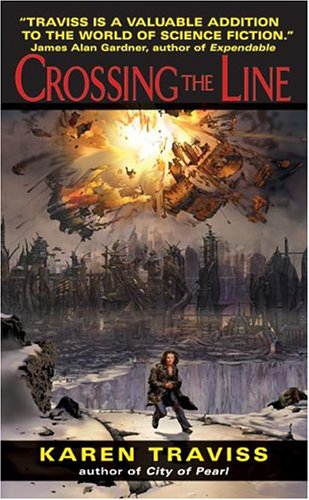
After having finished reading the marvellous City Of Pearl I immediately ordered the three follow up novels in the Wess'Har series. Shan Frankland along with Aras are now guests of the matriarchs. The C'naatat parasite, now swimming through the now ex-military officer, has brought benefits and terrors all of its own making; and it is these powers of near immortality that will eventual be its undoing. Being one hundred and fifty million miles from home does not stop the avaricious and deceitful militaries and governments of Earth from looking to bring her home, the easy way or the hard way. Aras, is the still viewed as a war criminal by the defeated Isenj, and Lindsay, now in full possession of the reasons as to why Shan was forced to do what she did is consumed by a need for vengeance to be served cold. The first half of this novel focuses primarily on two sperate story lines; Shan's rise to power with the matriarchs and her need to bring comfort and joy to Aras's life, plus the covert actions of the marines onboard the spaceship Acteon. The characters within this novel are all believable presented, the society and world building is done well, the mood of the novel is menacing - though somewhat disproportionately unevenly spread. The second half of the novel kicks off with some very real insights into how the lone journalist Eddie is forever forced to play politics with those in the know and those to whom he wants to report the truth. Altruistic, though somewhat quixotic at heart, he is somewhat of an ideal that I did not feel added a tremendous amount of spice to the novel. Given a lot of pages, I could only feel that the author was using him as a morality needle. The stupidity of humanity is given it due as well. The actions taken by the few to secure what they feel is the right thing to do, is shown up for all its mentally retarded hubris. No matter where we go it seems that humans fulfil this need of somehow unjustifiably turning a paradise found into a paradise lost. The personal interplay and upwelling of emotions that both Shan feels for the mistreated Bezeri and the righteous contempt with which is expound upon give the heroine in this novel many qualities that should be instilled in those with power and the need to change a world for the better. There is one moment within this novel which sums up perfectly why humanity needs to be taught a lesson. This is the only science fiction novel that has ever had me rooting for the aliens: that in itself is a very hard thing to do. A wonderful follow up that promises much more.

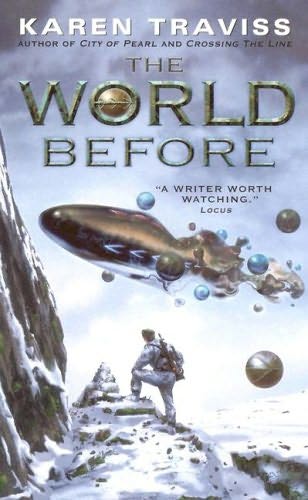
Genocide comes at a price. The aquatic Bezari are no more; victims of a salted nuclear bomb which aimed to extirpate the C'naatat has also completely brought about their extinction. Shan Frankland and especially Aras, know that they have failed to protect them from the gethes. The ramifications of this totally unwarranted attack are set in motion in The World Before. The World Before is the name given to the home world of the Wess'har. It is with their help that the matriarchs' of F'nar are going to bring about radical changes. Lindsay Neville and Mohan Rayat are found accountable for their actions with the deployment and detonation of the atomic weapon, the marine squad is declared innocent, and the human colony of Constantine on the planet Bezer’ej is forcibly uprooted. That is just the beginning! Though Shan sacrificed herself at the end of the second novel, the C'naatat parasite miraculously managed to preserve her life as she floated aimlessly in space for many months. The value of the parasite has increased exponentially with this wondrous of all discoveries. The political situation on Earth and especially the Isenj home world of Umeh is soon to be threatened by the arrival of Wess'har warship from the mother planet. The environmental crimes committed by one species on another is viewed very dimly by the Wess'har. Into this novel the central characters of the previous two books all play their allotted parts; this is this novel's one big failing. It fails to deliver upon its promise of a possible quickening and resolution of certain events In fact, at the end of the novel a somewhat confusing plot twist seems to deprive justice from actually being delivered. The journalist Eddie Michallet and his growing friendship for the Isenj minister Ual was a friendship theme explored and nurtured very well. Too much, way too much storytelling goes into the inter personal relations between Aras, Shan and Ade. Though the emotional turmoil experienced by the three is very well written, I could not help but feel it bogged down the pace of the novel. She simply draws into the well that is the mismatched trio too often. This is the darkest of the three novels in the series I have read but Traviss's narrative is very crisp and should be emulated. This novel does not go anywhere fast but it does introduce some thought provoking ideas and possible scenarios for worlds to be enjoyed by all, and not just the dominant species.

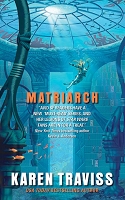
I will keep this review short. Matriarch fails to live up to the previous heights of the three previous books in the series. Unfortunately, it has the feel of a "middle" book throughout all its 388 pages. A well written but uninspired foray with predicable patterns of behaviour being repeated with characters whose modes of conduct chafed my nerves very quickly. A pity, as the ominous introduction to this novel was chilling and very sobering. With one or two more novels to go before the series is finished, I honestly hope that Karen Traviss brings about a sense of completion to this excellent, first contact with aliens, space opera.

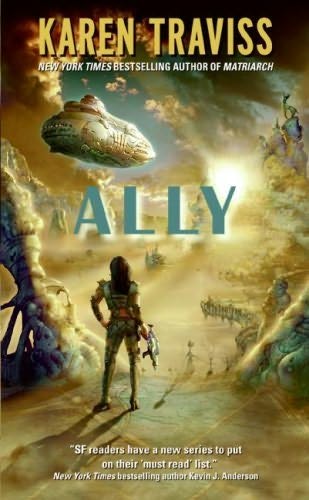
Synopsis
:The worlds orbiting Cavanagh's Star are in turmoil. Civil war on Umeh—ignited by outsiders—threatens to annihilate the teeming masses of a grossly overpopulated planet. On Bezer'ej, the handful of native aquatic creatures who survived extermination must take extraordinary and terrible steps to ensure the future of their kind . . .
And the interlopers from a distant planet called Earth can only watch the chaos they helped, in part, to create—knowing their home world will be next to suffer.
The day of reckoning is rapidly approaching when the powerful Eqbas will remake the Earth at the expense of its dominant species. And Shan Frankland—once a police officer, once human, now something much more—must decide where her loyalties truly lie: among the gethes, on a planet she once called home, or here, where a dying species presents her with a new and unexpected crisis.
There is no doubting that the ecological tropes that very strongly litter this entire sequence of novels is the central core of the entire of the series. To despoil one's own planet is sacrilege to the highly advanced Eqbas & Wess'har aliens. Such thoughtless actions are met with swift retributions. The Isenj are culled mercilessly in order to save both their planet and themselves from themselves. It is not as though the genocide of an entire species is taken lightly - far from it - it is that those who do not adopt or embrace a non destructive policy of cohabitation with their environments are punished for their greed, punished for their short sightedness, punished for the hubris, punished for self inflated sense of place on their own turf. The aquatic beings driven to the edge of extinction, now infected by the parasite c'naatat, are transformed by Lindsay Neville's coaching. Her own need for a sense of lavation powers her resolve to do the wrong thing for the right reason: let the Bezeri have near immortality, regardless of their own shameful genocidal past. Shan Frankland is, as ever, as uncompromising as ever. The introduction of a new alien species called the Skavu bodes very poorly for the decimated Isenj, and for planet Earth. These excellently armed eco-jihadists (I simply love that term) are yet another volatile ingredient added to an intensely overcharged space opera. I do have two caveats with Traviss' style of writing. For one thing he has this near insatiable need to draw all the strings of the plot back to Shan Frankland. Thoughts, modes of conduct, pasts, and motives all seem to vibrate back to her. Shan Frankland is too much of a central character upon which all various vagaries of the novel revolve. Also, she gives too much detail. You could honestly pick up book five of this series and within two hundred pages know all the major plot twists of the preceding four novels. It is not that she is guilty of ambage, she seems to want to drill into the reader all that has gone before. She tends to get very repetitive. Her strengths are many, and if I have made thus far in this six book series it says a lot about the quality of her work.
However, this cannot be viewed as anything but an excellently written pice of fiction. The fact that it is science fiction precludes it from being taken seriously by a large majority of the "serious" literature afficonados means little to me: Ally lifted my spirits.

| Authors | Awards | Blogs |
| Fanzines | Index | Magazines |
| Publishers | Retailers | Reviews |